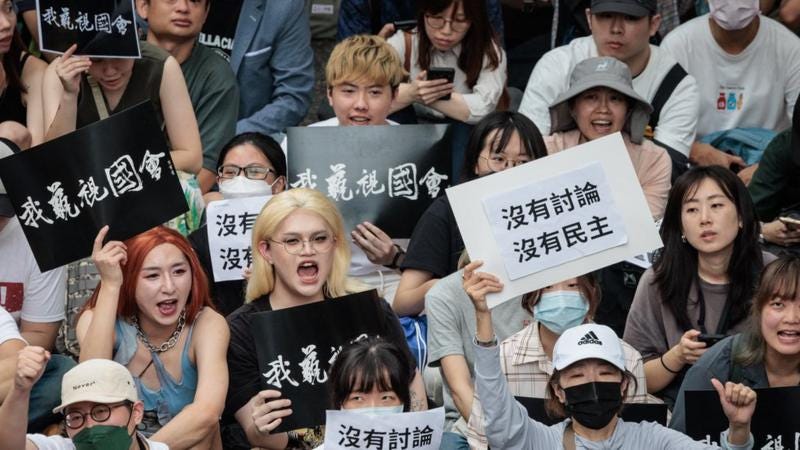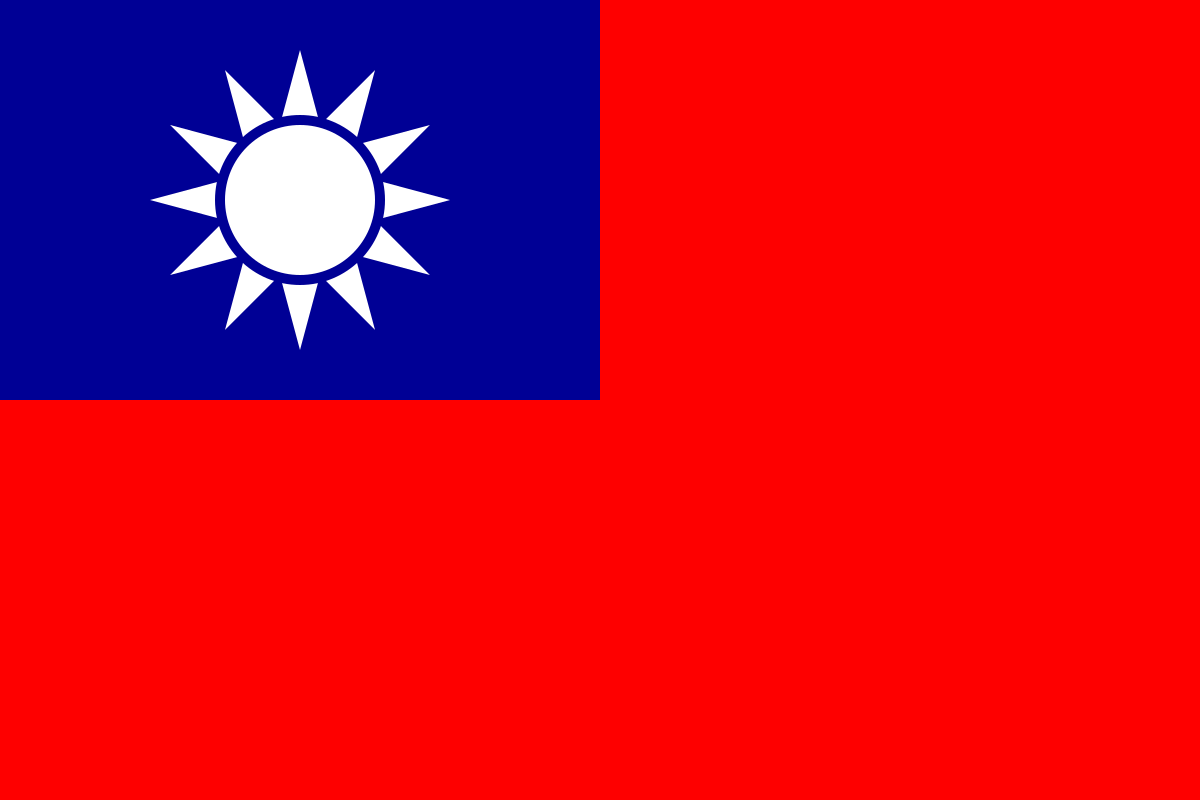💬 There is no Democracy Without Discussion
What is happening in Taiwan's Parliament?
Political Slogan of the Week: 没有讨论、没有民主
The phrase 没有讨论、没有民主 (méiyǒu tǎolùn, méiyǒu mínzhǔ), which can be roughly translated to "There is no democracy without discussion," has been seen and heard everywhere in the Taiwanese capital for the past few weeks. But what exactly is happening?
If you follow East Asian politics, you’ve probably heard that Taiwan has been facing internal turmoil ever since President Lai Ching-te took office.
In fact, while the DPP (Democratic Progressive Party, 民主进步党) won the presidential election, they lost their majority in parliament, which is now controlled by a coalition of the KMT (Kuomintang, 中国国民党) and the TPP (Taiwan’s People Party, 台湾民众党).
The DPP argues that the majority coalition is now trying to weaken the executive branch and strengthen the legislative branch to have a better hold on the country’s governance. This has resulted in physical fights between the two sides in parliament and massive civilian protests in the capital, Taipei.
Are you interested in legal matters? Let’s see what Chinese vocabulary we can learn from this crisis.
这次争议源于“蓝白”共同提出《立法院职权行使法》第25条修正条文,包括五大方向:总统国情报告常态化、立法院调查权及听证权、强化人事同意权、正副院长记名投票制,以及被认为最具争议的“藐视国会罪”。
“蓝白” (Lán bái) - “Blue and White”, signifies the coalition of KMT and TPP
争议 (Zhēngyì) - controversy, dispute
修正条文 (Xiūzhèng tiáowén) - amendment
国情报告 (Guóqíng bàogào) - state of the nation address
常态化 (Chángtài huà) - normalization, standardization
调查 (Diàochá) - investigation, survey
听证 (Tīngzhèng) - hearing, testimonial
人事同意 (Rénshì tóngyì) - personnel consent
藐视 (Miǎoshì) - despise, scorn, contempt
The controversy this time stems from the joint proposal by the "Blue and White" coalition to amend Article 25 of the Legislative Yuan's Act Governing the Exercise of Legislative Power. The proposed amendments include five main directions: regularizing the President's state of the nation address, enhancing the Legislative Yuan's powers of investigation and hearings, strengthening the power of personnel approval, implementing a recorded voting system for the election of the President and Vice President of the Legislative Yuan, and the most controversial proposal, the "contempt of the Legislature."
根据“藐视国会罪”内容,被质询人除为避免国防、外交明显立即的危害或依法应秘密的事项者并经主席同意者外,不得有“拒绝答复、拒绝提供资料、隐匿资讯、虚伪答覆”等藐视国会行为,违者经院会决议后可处新台币2万至20万元罚锾,逾期不改正可连续开罚。政府人员于立法院受质询时,为虚伪陈述者,依法追诉其刑事责任。此外,被质询人不得“反质询”,但未有明文定义何谓“反质询”。
“藐视国会罪” (Miǎoshì guóhuì zuì) - “Contempt of the Legislature” (see below)
质询 (Zhìxún) - inquiry, interpellation
除为 (Chú wèi) - except
避免 (Bìmiǎn) - avoid, prevent
立即 (Lìjí) - immediately, at once
隐匿 (Yǐnnì) - conceal, hide
虚伪 (Xūwěi) - false, hypocritical
答覆 (Dáfù) - reply
违者 (Wéizhě) - violator, offender
新台币 (Xīn táibì) - New Taiwan Dollar (TWD)
罚锾 (Fáhuán) - fine, monetary penalty
逾期 (Yúqī) - overdue, past the deadline
陈述 (Chénshù) - statement, presentation
追诉 (Zhuīsù) - prosecute, press charges
刑事责任 (Xíngshì zérèn) - criminal liability, criminal responsibility
反质询 (Fǎn zhìxún) - counter-interrogation, cross-examination
明文 (Míngwén) - explicit, clearly stated
定义 (Dìngyì) - definition
何谓 (Héwèi) - what is, what does ... mean
According to the "contempt of the Legislature," individuals being questioned, except in cases where avoiding immediate and obvious harm to national defense, foreign affairs, or legally confidential matters is necessary and approved by the chairman, must not engage in contemptuous behaviors such as "refusing to respond, refusing to provide information, concealing information, or giving false answers." Violators, upon resolution by the Legislative Yuan, can be fined between NT$20,000 and NT$200,000, and continuous fines can be imposed if the violation is not corrected within the stipulated period. Government personnel who make false statements while being questioned in the Legislative Yuan will be prosecuted for criminal liability according to the law. Additionally, individuals being questioned are not allowed to "counter-question," although the term "counter-question" has not been explicitly defined.
About Taiwan’s Government
We all know that Taiwan’s former name is the Republic of China (中华民国 - Zhōnghuá mínguó), but do you know that the ROC government is made out of five disctinct branches?
Three of those chambers are the same than in most democratic governements, they are:
行政院 (Xíngzhèng yuàn) - The Executive Yuan
立法院 (Lìfǎ yuàn) - The Legislative Yuan
司法院 (Sīfǎ yuàn) - The Judicial Yuan
Additionally, the ROC has two extra chambers:
监察院 (Jiānchá yuàn) - The Control Yuan, the supervisory and auditory branch of the government.
考试院 (Kǎoshì yuàn) - The Examination Yuan, civil service commission branch, in charge of validating the qualification of civil servants, a direct heritage of China’s old Imperial Examination.
Taiwan is a small country, yet it is full of complexities!
Antoine & Dorota





